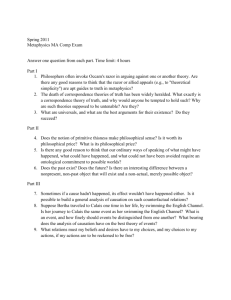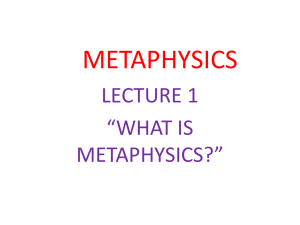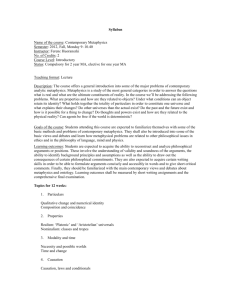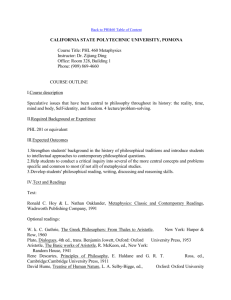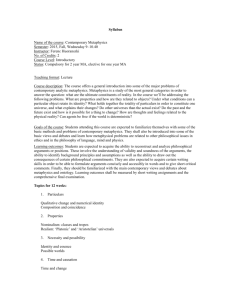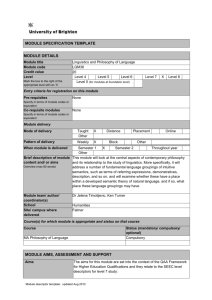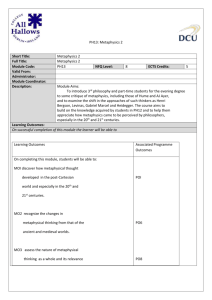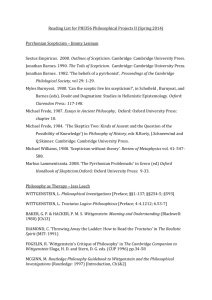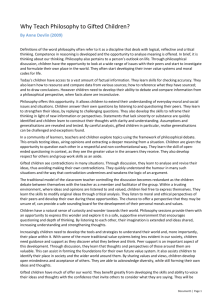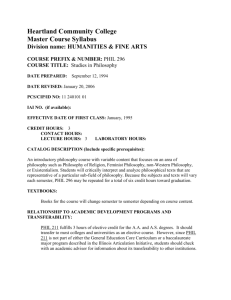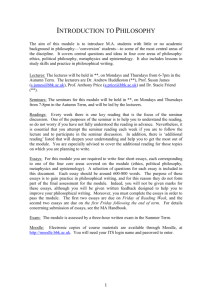PHIL 4513: METAPHYSICS Dr. Neal Judisch Fall 2008 Dale Hall
advertisement
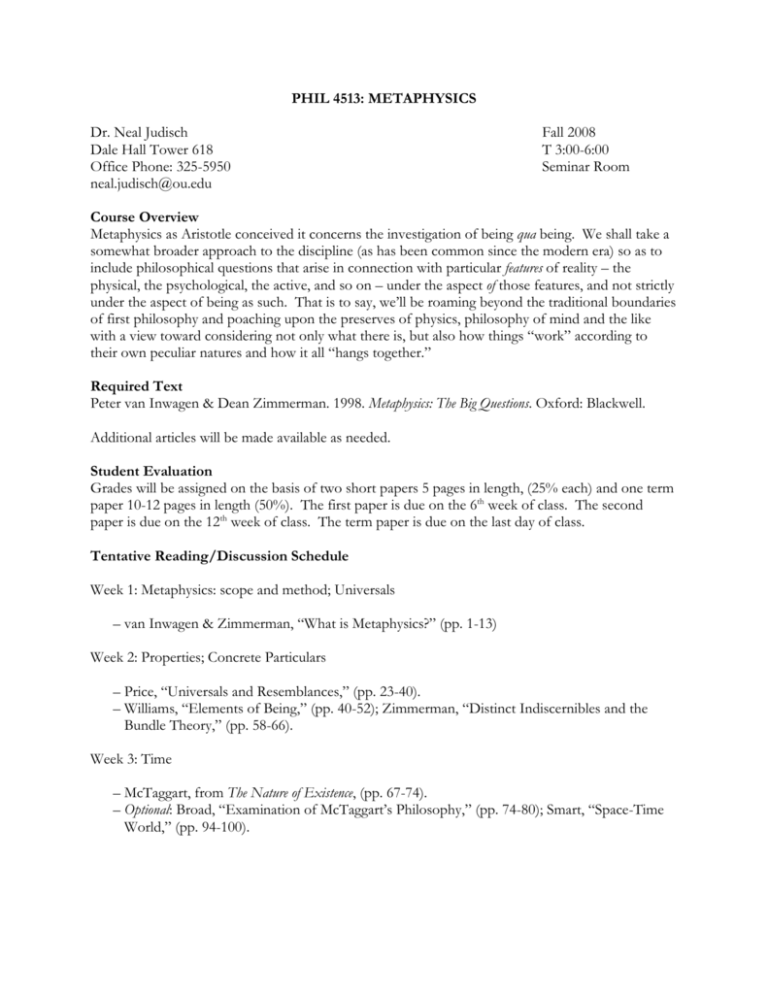
PHIL 4513: METAPHYSICS Dr. Neal Judisch Dale Hall Tower 618 Office Phone: 325-5950 neal.judisch@ou.edu Fall 2008 T 3:00-6:00 Seminar Room Course Overview Metaphysics as Aristotle conceived it concerns the investigation of being qua being. We shall take a somewhat broader approach to the discipline (as has been common since the modern era) so as to include philosophical questions that arise in connection with particular features of reality – the physical, the psychological, the active, and so on – under the aspect of those features, and not strictly under the aspect of being as such. That is to say, we’ll be roaming beyond the traditional boundaries of first philosophy and poaching upon the preserves of physics, philosophy of mind and the like with a view toward considering not only what there is, but also how things “work” according to their own peculiar natures and how it all “hangs together.” Required Text Peter van Inwagen & Dean Zimmerman. 1998. Metaphysics: The Big Questions. Oxford: Blackwell. Additional articles will be made available as needed. Student Evaluation Grades will be assigned on the basis of two short papers 5 pages in length, (25% each) and one term paper 10-12 pages in length (50%). The first paper is due on the 6th week of class. The second paper is due on the 12th week of class. The term paper is due on the last day of class. Tentative Reading/Discussion Schedule Week 1: Metaphysics: scope and method; Universals – van Inwagen & Zimmerman, “What is Metaphysics?” (pp. 1-13) Week 2: Properties; Concrete Particulars – Price, “Universals and Resemblances,” (pp. 23-40). – Williams, “Elements of Being,” (pp. 40-52); Zimmerman, “Distinct Indiscernibles and the Bundle Theory,” (pp. 58-66). Week 3: Time – McTaggart, from The Nature of Existence, (pp. 67-74). – Optional: Broad, “Examination of McTaggart’s Philosophy,” (pp. 74-80); Smart, “Space-Time World,” (pp. 94-100). Week 4: Change – Chisholm, “Identity through Time,” (pp. 173-185); Lewis, “Problem of Temporary Intrinsics,” (pp. 204-206). – Optional: Zimmerman, “Temporary Intrinsics and Presentism,” (pp. 206-219); Quine, “Identity, Ostension, and Hypostasis,” (pp. 186-188); Lewis “In Defense of Stages,” (pp. 190-192). Week 5: Personal Identity – Chisholm, “Which Physical Thing Am I?” (pp. 291-296); Swinburne “The Dualist Theory,” (pp. 317-333); Shoemaker, “A Materialist Account,” (pp. 296-310). Week 6: Causation – First Paper Due – Hume, “Constant Conjunction,” (pp. 221-226); Reid, “Efficient Cause and Active Power,” (pp. 226-227). – Lewis, “Causation,” Journal of Philosophy 70 (1973), pp. 556-567. Week 7: Freedom (I) – Hobart, “Free Will as Involving Determinism & Inconceivable Without It,” (pp. 343-356); Chisholm, “Human Freedom and the Self,” (pp. 356-365). – Optional: Kane, from The Significance of Free Will, Oxford (1996); van Inwagen, from An Essay on Free Will, Oxford (1983). Week 8: Freedom (II) – O’Connor, “The Agent as Cause,” (pp. 374-380); Kane, “Two Kinds of Incompatibilism,” Philosophy and Phenomenological Research 50 (1989), pp. 219-254; van Inwagen, “The Mystery of Metaphysical Freedom,” (pp. 365-374). – Optional: Clarke, “On the Possibility of Free, Rational Action,” Philosophical Studies 88 (1997), pp. 37-57. Week 9: Mental Causation (I) – Davidson, “Mental Events,” in Essays on Actions and Events, Oxford (1980); Kim, “The Myth of Nonreductive Materialism,” Proceedings and Addresses of the American Philosophical Association 63 (1989), pp. 31-47. Week 10: Mental Causation (II) – McLaughlin, “Type Epiphenomenalism, Type Dualism, and the Causal Priority of the Physical,” Philosophical Perspectives 3 (1989), pp. 109-135; Horgan, “Mental Quausation,” Philosophical Perspectives 3 (1989), pp. 47-76; Kim, Physicalism, Or Something Near Enough, Princeton (2005), chapters 5-6. Week 11: Freedom & Mental Causation Reviewed – Sosa, “Free Mental Causation!” (unpublished manuscript); Unger, “Free Will and Scientiphicalism,” Philosophy and Phenomenological Research 65 (2002), pp. 1-25. Week 12: Agency – Second Paper Due – Velleman, “What Happens When Someone Acts?” Mind 101 (1992), pp. 461-481; Nagel, “The Problem of Autonomy,” in The View From Nowhere, Oxford (1986). – Optional: Bishop, “Agent-Causation,” Mind 92 (1983), pp. 61-79. Week 13: The World; God – James, “The Problem of Being,” (pp. 415-418); Parfit, “The Puzzle of Reality,” (pp. 418-427). – Rowe, “The Cosmological Argument and the Principle of Sufficient Reason, (pp. 431-441); Anselm, from the Proslogion, (pp. 441-443); Malcolm, “Anselm’s Ontological Arguments,” (pp. 443-453). Week 14: Thanksgiving Holiday – No Class Week 15: Realism & Anti-Realism – Quine, “Speaking of Objects,” (pp. 385-388); Putnam, “After Metaphysics, What?” (pp. 388392); Sosa, “Nonabsolute Existence and Conceptual Relativity” and the Addendum, (pp. 399410). Week 16: Wrap Up – Term Paper Due
